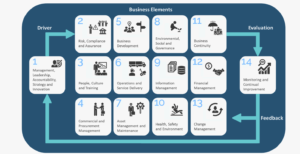
In simple terms, a business model defines the way an organisation and the way it operates. According to management expert Peter Drucker, it should answer three imperative questions:
Who is the customer?
What does the customer value?
How does the organisation deliver value and make money?
However, since organisations need to be agile to compete in an ever-changing market, so does their business model as at some given time, one or more of the assumptions behind it will change.
The only constant in life is change
Rather than waiting for a large change to happen and completely disrupt an organisation, change can be managed through an always-on approach. It is recommended that organisations implement an Integrated Management System and Continuous Improvement framework to assure business success.
What is a management system? According to integrated management expert Ian Dalling in his article Rethinking Management System Standards, a management system is simply the organisation’s overall or partial plan for how it is to be managed and operated to deliver its purpose, which is the supply of goods and/or services to satisfy customers. Put more formally, a management system is a set of formally defined intentions, principles, rules and guidance used to systematically manage an organisation’s structures and processes to achieve its objectives. A management system can be primitive or very sophisticated and can even manage its own evolution based on feedback and analysis of customer and other stakeholder needs, expectations and aspirations. All organisations, regardless of type and size, can benefit from an appropriate management system. As managing all aspects of change is critical to success, these processes also need to be included in the management system.
Traditionally, organisations have tended to implement multiple individual management systems in order to cover specific business areas, for example quality management, environmental management and occupational health and safety. These management systems tend to operate in silos without an integrated view across the business value chain. In addition, we have discovered that for organisations with multiple management systems, there are many common elements including vision, purpose and objectives, policies, structure and responsibilities, business continuity and emergency plans, performance indicators and monitoring, preventative and corrective actions, internal and external audit and management review, to name but a few.
At Cubility, we have developed an Integrated Management System (IMS) framework that divides an organisation’s activities into its respective business elements and monitors, evaluates and reports on the performance of each, ensuring they work towards achieving the business’s overarching goals without duplicating effort.
The framework also has a continual improvement mechanism embedded into it which analyses the overall business performance and ensures that it continues to achieve its goals by operating effectively as well as identifying opportunities for improvement. This follows the Plan-Do-Check-Act (PDCA) cycle of continual learning and improvement so that the organisations’ business model can remain agile and transform when a challenge or opportunity arises.
Cubility’s Integrated Management System Framework

In addition, the Cubility IMS framework also enables continual improvement across structure and processes including standards, procedures, work instructions and enabling technology, for each business element.
In summary, the benefits of an IMS include:
- Improved business focus
- A more holistic approach to managing business risks
- Continuous improvement framework across all business areas
- Less conflict between individual management systems
- Reduced duplication and bureaucracy
- More effective and efficient audits both internally and externally
In an ever-changing market, organisations need to maintain a nimble business model to remain competitive. To do so, it is recommended that they implement an IMS with continued improvement mechanisms to assure business success.
Cubility is a management and technology consultancy that works with businesses to solve operational problems, improve compliance and manage change well. Our multi-disciplined team is equipped with the technical and operational knowledge as well as project execution skills to ensure the success of any project. If your business needs assistance, please get in touch with us. We would love to hear from you.
